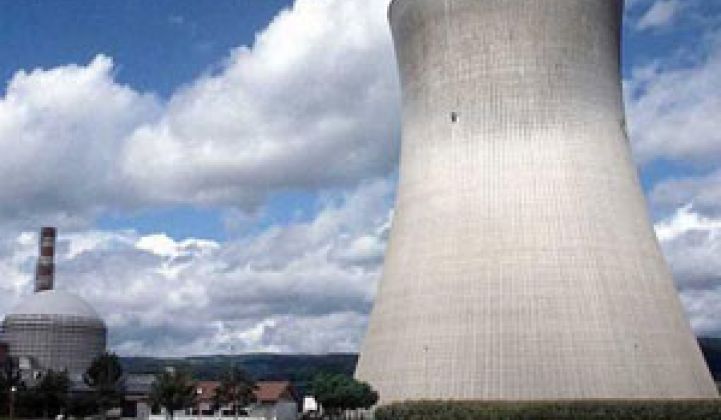If you ask Nobel laureate Arno Penzias what could be the next big technology breakthrough for fighting climate change, he would say: nuclear power.
"The thing as big as the introduction of nuclear power is the introduction of nuclear power. We need this desperately," said Penzias at the Cleantech Forum in San Francisco Monday. "Life on this planet depends on us going nuclear. We as a planet needs to take that option so we can build a civilized world around it."
Penzias' sentiment is heard more and more commonly these days, as President Obama makes clean energy – and the country's ability to supply its own energy needs – a top priority for his administration. What makes nuclear power attractive: it's zero emission and ability to provide consistent power. What makes it unsettling: the disposal of its radioactive wastes.
Obama has said he wouldn't rule out nuclear based on ideological ground (see YouTube video). But a provision that could have provided billions in loan guarantees to the nuclear industry didn't make it into the $787 billion stimulus package signed by Obama last week.
Rosa Yang, vice president of technology innovation at the Electric Power Research Institute, an American utility industry group, recently spoke of a "renaissance in nuclear" because of nuclear power is attracting a growing interest from different countries.
Penzias wasn't the only outspoken supporter of nuclear at the Cleantech Forum in San Francisco Monday. Barbara Thomas Judge, chairman of the U.K. Atomic Energy Authority, gave a strong pitch for developing more nuclear power.
Judge said people had good reason to be scared of nuclear power more than two decades ago because of the reactor disasters of Chernobyl and Three Mile Island. But she said better technologies have come along and, frankly, the scope of the waste disposal problem has been exaggerated.
"There is a myth about the waste issue: Listen you guys, only 10 percent of it are from civil nuclear power. The other 90 percent of wastes that already exist are from weapons [programs]," Judge told an audience. "We were pretty sloppy with this staff in the Great Britain. Whatever we do about building nuclear power plants, we've got to clean up."
If the United States isn't quick to embrace nuclear, other countries certainly are. Sweden is looking at ditching its ban on nuclear power. Abu Dhabi, the oil-rich state of the United Arab Emirates, would like to get 25 percent of its electricity from nuclear.
There are 436 active nuclear reactors worldwide with a total capacity of about 370 gigawatts, and 44 reactors are under construction, according to the International Atomic Energy Agency. In the United States, 31 states have commercial nuclear power plants with a total of 104 reactors, said the federal Energy Information Administration (a power plant can have more than one reactor).
Judge promotes replacing old power plants with new and improved ones, an approach that might make the projects gain community acceptance more quickly. That certainly appears to be the plan in the United Kingdom.
Judge also predicts a shortage in skilled nuclear reactor designers and builders, given the world's new found interest in this form of energy.
There are several widely used nuclear technologies today. Key players in the sector include General Electric, Westinghouse Electric, Areva and Atomic Energy of Canada.



